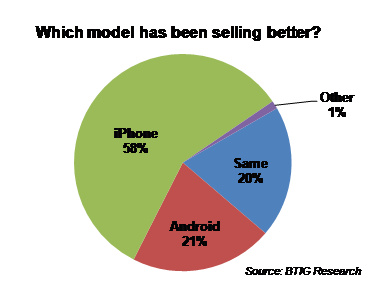
Being an analyst has to be a rough job, especially for those who hate busy work. After all, these people have to find something to analyze all the time, just to make sure that they stay at the top of their game (and so people notice the company, too). And while many people might suggest that analysts don’t necessarily always show the “full picture,” there’s always something interesting to take away from these reports. The most recent report is brought to us by BTIG Research. Walter Piecyk and others at that company took it upon themselves to call up a few Verizon and AT&T stores and find out which handset is taking the top-spot at those locations. Their results are definitely interesting, even if they aren’t all-encompassing.
First, let’s get this out of the way: BTIG Research’s data was collected over a time span of three weeks, and from a total of 250 AT&T and Verizon stores. Obviously 250 and AT&T and Verizon stores in the United States isn’t going to get the total picture, and there’s probably plenty more happening at other stores across the nation, but if we’re to look at the suggestion of these pie charts, it would seem that Apple’s iPhone 4 still has a huge fight left in it, despite its old age (relative to smartphones, of course).
In more than 50 percent of the stores surveyed, the iPhone and iOS were sitting comfortably in first place. According to the same research, Google’s Android platform was able to take a respectable second place with 21 percent, while the two platforms were tied at 20 percent throughout the stores. And, based on carrier, Apple’s iPhone comes in at 65% at AT&T stores, while the iPhone has a considerable lead with 51% on Verizon.
What’s interesting to note with the Android results, though, is that BTIG Research only compared those numbers to 4G-enabled devices on those networks. Meaning, there aren’t any “regular” Android-based devices making it into the survey, and therefore not helping the numbers in any way. What makes it more interesting to see these comparisons, is the fact that the iPhone 4 isn’t a 4G-enabled device on AT&T or Verizon, so why BTIG Research decided to only use 4G-enabled Android devices, which obviously limits the number of devices available for the research.
Truth be told, I’m not at all surprised that the iPhone is still out-selling Android on AT&T’s network. After all, ever since 2007 and with AT&T’s exclusive right to carry the iPhone, the carrier has been known as the “iPhone carrier” to a lot of people for many years. That’s hard to break, and something that’s obviously still working quite well in Apple’s favor on the network. On Verizon’s side of things, though, I think there might be a different story to tell if the research compared all Android devices currently available (during those three weeks of polling, naturally), versus the other platforms (specifically, iOS) on the network. A very different story indeed.
But, what do you think of this poll? Obviously there’s no way to say that this is indicative of numbers all over the country, but there’s also no way to say that it isn’t. It’s a “small” poll, but it’s also a pretty large one, and the numbers seem to speak for themselves. Are you surprised that the iPhone is still edging out Android, or do you think a poll with more stores would reveal different numbers? Let me know in the comments below what you think.